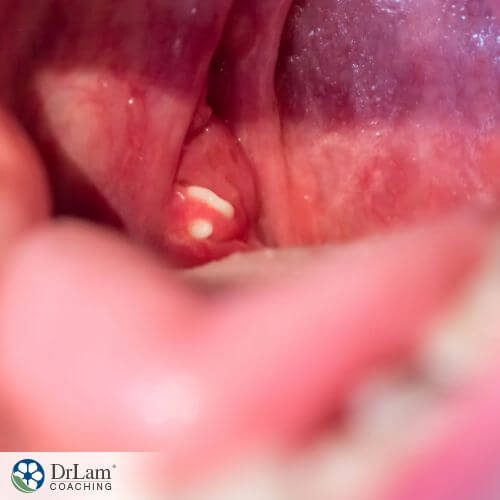 You may have never heard of tonsil stones, but this little-known condition is actually more common than you might think. In fact, you might have had it without even realizing it. But even though this condition often goes unnoticed, it still causes some very irritating and embarrassing symptoms such as bad breath and discomfort. Let’s take a look at what these growths are and what to do about them.
You may have never heard of tonsil stones, but this little-known condition is actually more common than you might think. In fact, you might have had it without even realizing it. But even though this condition often goes unnoticed, it still causes some very irritating and embarrassing symptoms such as bad breath and discomfort. Let’s take a look at what these growths are and what to do about them.
Your tonsils are two small organs that play an important role in your immune system. They contain white blood cells that help fight infections. Whenever something goes in your mouth, it needs to go past your tonsils. In the case of bacteria, your tonsils can actually trap them, preventing them from advancing any further into your body. This makes your tonsils one of your immune system’s first lines of defense against invaders.
Sometimes, bacteria and debris such as food, mucus, or dead cells get stuck in the grooves on the surface of the tonsils. This causes the lymphocytes to attack, trying to get rid of the invaders. Once these white blood cells are done, they leave behind calcified lumps. Usually, you would swallow these lumps without knowing and get rid of them that way. But if these lumps get stuck on the tonsils, they continue to grow and are fed upon by bacteria. Over time, they become what’s known as tonsil stones.
These stones are usually very small, but they can grow until they’re around an inch wide. They’re hard and white or yellow in color and are completely harmless. In fact, they’re quite similar to the dental plaque that causes gum disease and cavities. Unfortunately, these growths are also a breeding ground for bacteria and contain sulfur, which is why they can release a foul odor.
As long as you have tonsils, you’re at risk of developing tonsil stones. However, these factors will increase your likelihood of developing these growths:
However, you can also develop these stones when you don’t have any of these risk factors.
You may not have any symptoms at all if your tonsil stones are small. But as they grow, they may cause issues like:
If your tonsil stones are small and don’t cause symptoms, then you don’t need medical interventions. However, if they’re larger, then there are a couple of options that your doctor may want to try:
This can help to address the infection but will not get rid of the stones themselves. It may also cause unwanted side effects.
 If your stones are very large, then your doctor may recommend removing them through surgery. They may also recommend removing your tonsils completely, but this is usually performed only as a last resort.
If your stones are very large, then your doctor may recommend removing them through surgery. They may also recommend removing your tonsils completely, but this is usually performed only as a last resort.
Laser resurfacing can be performed to change the shape of your tonsil and cut down on the areas for stones to grow.
There are also some safe, gentle, and effective ways to try to get rid of tonsil stones at home. Here’s what to try:
If you don’t drink enough water, you will have a dry mouth. This will encourage the growth of mouth bacteria. Drinking water can also help to flush debris out of your mouth, so it doesn’t collect on your tonsils. That’s why increasing your water intake is such an effective way to prevent tonsil stones.
Add one tablespoon of this vinegar to eight ounces of filtered water and gargle with it 1-3 times a day. The vinegar can help to break down the stones and the gargling will help to dislodge them.
Good oral hygiene is key to preventing these tonsil growths. This means you need to brush and floss regularly, preferably after every meal.
Oil pulling helps improve the health of your teeth and gums and helps detoxify your body, and it may help tonsil stones as well. Just put a tablespoon of coconut, sesame, or olive oil in your mouth and swish it around for 10 to 20 minutes. Once you’re done, spit it out into the trash bin - it can clog your sink if you spit in there. Do this every day for a cleaner, healthier mouth.
Chewing on one clove of garlic every day will help to kill the bacteria in your stone, which will naturally improve the smell of your breath, once the smell of garlic goes away. It may also help prevent stone growth.
Combine half a teaspoon of salt with eight ounces of water and gargle daily or a few times a day. This helps to detoxify your mouth and get rid of stray debris, which may help prevent the build-up that can lead to stones on the tonsils.
Taking probiotics can help to balance the good and bad bacteria in your body, preventing a build-up of bad bacteria. Get your probiotics from foods like kimchi, yogurt, or kefir if you can, but you can also take supplements if you struggle with this.
Most stones come out naturally when you cough. So, if they aren’t causing any pain or discomfort, just wait and see what happens. Usually, a stone will come out eventually when you cough. If it does, gargle with salt water to make sure your tonsils are nice and clean afterward.
One condition that can make you more susceptible to tonsil stones is adrenal fatigue. This condition can put a damper on your immune system, making it less able to remove stone-causing bacteria.
When you have Adrenal Fatigue Syndrome (AFS) you’re more likely to experience issues related to immune system dysfunction. AFS occurs when ongoing stress forces the ongoing activation of the NeuroEndoMetabolic (NEM) stress response. The NEM stress response uses cortisol to help your body cope with stress and prevent damage. The cortisol does this by making changes in your body’s circuits, composed of related organ systems, that go back to normal once the stressful situation has passed.
AFS only occurs when you’re under chronic stress for a long period and the NEM stress response has been active for too long. With this condition, the adrenals, which release cortisol, start to fatigue, leading to dysfunctions throughout the body.
One of the first circuits to become dysfunctional when you have AFS is the Inflammation Circuit.
 The Inflammation Circuit is composed of the immune system, gut, and microbiome. When you’re healthy, these three components work together to protect your body against damage. But when the circuit becomes unbalanced, the health of each component declines.
The Inflammation Circuit is composed of the immune system, gut, and microbiome. When you’re healthy, these three components work together to protect your body against damage. But when the circuit becomes unbalanced, the health of each component declines.
People with AFS and Inflammation Circuit imbalances often experience a wide range of symptoms and health problems such as ongoing infections, fatigue, and autoimmune disorders as the immune system becomes overactive and dysfunctional.
When you’re healthy, tonsil stones aren’t usually a problem. But when you have AFS and Inflammation Circuit imbalances, you may be more likely to develop these stones. Your immune system will struggle to fight off the bacteria that enters your body.
It’s important not to ignore these kinds of health issues when you have AFS. Clearing up even small sources of inflammation will help to lower the activation of the immune system and chronic inflammation levels. And this kind of gentle rebalancing is key to recovering from AFS.
You might not have heard of tonsil stones before, but if you have bad breath and pain or discomfort in your throat, then this could be the culprit. This isn’t a condition to be afraid of, because it’s harmless and fairly easily solved. Here’s what to do if you suspect that you have these harmless growths in your throat:
For more information on health conditions that can impact your well-being and quality of life, talk to our team at +1 (626) 571-1234 or click here.
Tonsil stones are benign growths that can occur on your tonsils at the back of your throat, and they are very common. Despite being harmless, they can make your breath foul and cause pain or discomfort, so don’t ignore them if they’re causing symptoms like these. A few extra steps are all that's needed to start getting rid of them.
